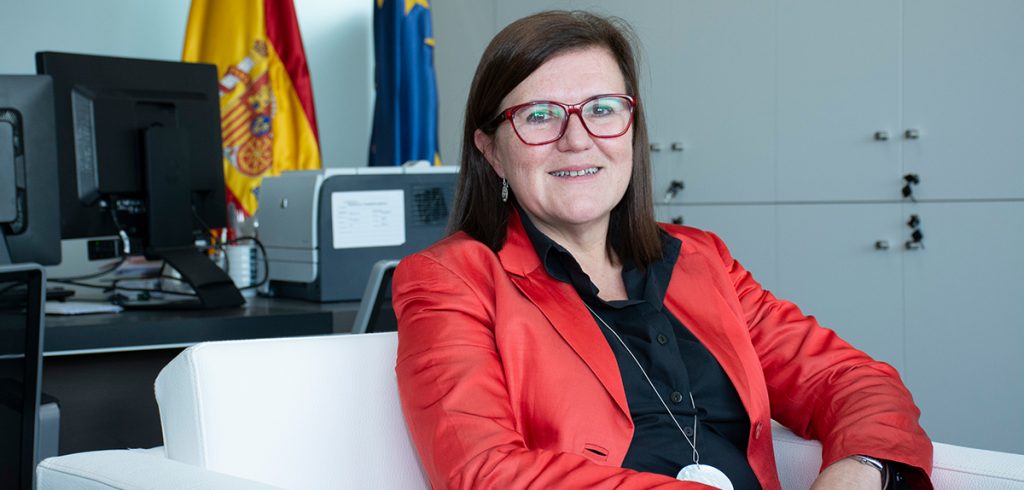Since 2003, she has held the position of full professor of Electronic Technology at the Higher Technical School of Industrial Engineering of UPM (ETSII-UPM), where she worked during her entire career as an educator and researcher until her appointment as director general and, later, secretary general for Innovation at the Ministry of Science and Innovation.
Professional experience
She has been the director of the Center for Industrial Electronics, assistant director of Research and International Affairs at the ETSII-UPM and, later, director of the Department of Automation, Electrical and Electronics Engineering and Industrial Computing.
In 2018 she was appointed as director general of R&D at the Ministry of Science, Innovation and Universities, and in January of 2020 she was appointed secretary general for Innovation at the Ministry of Science and Innovation. Due to her position, she is the president of the CDTI and the president of the Board of Trustees of FECyT.
Education
- Doctora ingeniera industrial por la Universidad Politécnica de Madrid (1996).
- Ingeniera industrial por la UPM (1990).
What is your assessment of the ESA Ministerial Council?
I believe that, overall, we could say that it has been a highly successful Ministerial Council both for the ESA and for Spain, and this is despite existing strains in the international landscape, such as high inflation and component shortages.
First and foremost, I believe it is important to highlight that the proposal of the director general of the European Space Agency has been very attractive and ambitious, exceeding even the one of Seville 2019, which has already been a major investment success.
For its part, the Government has made a great effort for Spain to strengthen its position in an area that is as strategic as Space. While already during the Seville Ministerial Council in 2019 a 25% increase was approved for our ESA contribution, this year in Paris this increase has been an additional 20%, meaning that in just three years, the cumulative rise has been 50%, going from 200 to 300 million euros per year.
It has been a highly successful Ministerial Council both for the ESA and for Spain, and this is despite existing strains in the international landscape, such as high inflation and component shortages
For Spain, this has been a Ministerial Council that has arrived at a particularly ‘exciting’ moment since, as you are aware, we are taking our final steps toward the creation of the Spanish Space Agency. Furthermore, it has been a Ministerial Council under the umbrella of the Aerospace PERTE, which opens up excellent opportunities to seek synergies between investments and maximize the ROI for the sector.
As for specific programs, with a total investment of 1.5 billion in 5 years, 932 of which are allocated to new programs, one would be hard-pressed to highlight specific items without forgetting to mention key proposals.
However, I believe that, most of all, we could say that it has been the Ministerial Council of space exploration and astronauts, with a resounding success in Spain, which has succeeded in getting two Spaniards selected into the astronaut corps for the first time since Pedro Duque managed to do so in 1992.
However, I believe that, most of all, we could say
that it has been the Ministerial Council of space
exploration and astronauts, with a resounding
success in Spain, which has succeeded
in getting two Spaniards selected into the
astronaut corps for the first time since Pedro
Duque managed to do so in 1992.
Additionally, due to its ambition for leadership supported by our great capabilities, Spain has invested in strategic programs that offer us opportunities toward this end, such as the new LEO PNT navigation program, the EU-ESA Copernicus program, the DRACO space defense mission and the scientific leadership of the mission of the Arrakihs science program. But, as I already said, there are undoubtedly many others that I could mention.
What can Spain do to seize as much as possible the outcome of this meeting, so important for the industry?
In addition to the aspects that I already mentioned related to extraordinary matters, such as the creation of the Spanish Space Agency and the Aerospace PERTE, the success of our participation in the Ministerial Council, where Spain has been represented at the highest level by the minister of Science and Innovation, it opens up opportunities for the national space ecosystem.
We have two new ambassadors—Sara García and Pablo Álvarez—who will undoubtedly help create and attract new talent.
We are also in a great position to leverage the new initiatives presented by ESA that Spain has helped put forth.
With programs such as LEO PNT, Copernicus, Aeolus-2 and Secure Connectivity, we need to boost the use of Space. The time has come to dive deeper into the integration of space in other fields, of focusing more on the end user, of fostering synergies with the scientific community.
The aspects are shared by all of Europe: at ESA, member states have adopted a resolution aimed at accelerating the use of Space in Europe, and the issue will also be the subject of the political debate in the upcoming European Union competitiveness council. Spain must, and can, spearhead this important evolution.
The structure, financing and opportunities are there. Now, the industry, in cooperation with the rest of the domestic stakeholders, must seize this opportunity.
The Spanish space sector is experiencing a time of growth. What is, in your opinion, the role that spain must play?
I consider—and I believe this is good news—that Spain is already consolidated and recognized as one of the great European space powers (the fourth in the EU landscape and the fifth, jointly with Belgium, in the realm of the ESA). And this position is not only related to its investment, where there are countries that allocate a higher GDP percentage than us to Space or even to overall investment, but also to its capabilities, talent, competitiveness, industrial network, etc. In other words, to the entire space ecosystem.
In this regard, Spain has the chance to leverage the strong points that are already paying off in other economic areas, such as its role as a bridge for cooperation with Ibero-America. In relation to this, as an example, the creation of the Spanish Space Agency opens a door to advance toward the implementation of shared initiatives or even to a prospective partnership with the Latin American and Caribbean Space Agency (ALCE), which was also recently created.
Our industry makes significant investments on innovation and development. In your opinion, Where does Spain need to focus more efforts or technological innovation?
Traditionally, space has been an environment where technological advances, while quite relevant, have come at a much slower pace than in other sectors.
However, this has been considerably changing during the last few years, where advances have significantly accelerated. In addition to this, Space –and this is a positive thing—has become more permeable to advances accomplished in other technological areas.
For this reason, I believe that we should take a look at the advances that are taking place around the world in fields such as artificial intelligence, quantum developments, advances related to instrumentation and production improvements such as those related to additive manufacturing.
Space breakthroughs will undoubtedly come from these fields. All of this is accomplished thanks to a close collaboration between different stakeholders: scientists and academia, major corporations, mid-caps, startups and, naturally, the Administration, which will continue to support the ecosystem.
In your opinion, What does having a cutting-edge space sector offer to a country like Spain and its economy?
Space is a strategic sector for many reasons. These reasons are related not only with the development of the sector itself (which incentivizes technology, offers highly-qualified jobs and generates direct and ancillary industries), but also with the use of data and of the services that we have thanks to satellites and their impact on addressing the great challenges we face as a society.
The role that space has had in certain events of the last few years, such as the war in Ukraine, the volcano eruption in La Palma and the diagnosis of the effects of the fires we have seen this last summer, has been of major importance. For these exceptional services and for the ones that we use in our everyday lives (geopositioning, weather forecast, communications, etc.), we need to both take part of major European projects, and to have the ability to develop new constellations tailored to our needs. Projects such as the Atlantic Constellation, in collaboration with Portugal, are an example of initiatives that add capabilities to Spanish companies and open up an array of space uses tailored to the needs of the country in regard to agriculture, fire detection and prevention, climate change monitoring, low data rate communications, etc.
But beyond that specific aspect, space is a driver of the economy and a vector for the creation of value. While it is a relatively small sector in terms of GDP, it offers a high added value to scientific, technological and innovation-related aspects. Moreover, the workers that it employs are mostly composed of higher education graduates and PhDs, which evidences its role as a driver of technological and industrial development. This sector is also highly resilient, as proven during the various crises of the last few years, continuing to grow in terms of employment and turnover.
Por otro lado, el espacio, con su papel cada vez más relevante en el día a día de los ciudadanos recordemos que cada día nos conectamos a decenas de satélites y como herramienta para la implementación y control de políticas públicas ha
ido ganando peso en las iniciativas europeas, donde la participación de los países solo se puede lograr gracias a un tejido industrial fuerte y competitivo como el nuestro.
How do you see the future of Spain in the space sector?
I am very positive in that which pertains to the future of the space sector. I believe that we have built a very solid foundation with a highly important institutional effort, and I have no doubt that the major advances achieved throughout these years imply the consolidation of our leadership role in Europe.
The major advances achieved throughout these years imply the consolidation of our leadership role in Europe"
In addition, in the medium term, I am certain that the Aerospace PERTE and the creation of the Spanish Space Agency will serve to bestow Spain with the structure and funding required by the sector to grow stronger, have a greater stability and continue its growth.
I would like to highlight the incipient space sector that is emerging driven by different highly-innovative startups with a high potential for growth. They were born and are growing in Spain within the framework of the sometimes mistakenly called ‘New Space’. From launch vehicle manufacturers, through satellite integrators, cameras and sophisticated instruments, onboard computers and microthrusters, to those who work with the data generated in Space, the sector in Spain has great potential. We must turn this potential into a reality, with strong, well-established companies. Without a doubt, the Aerospace PERTE and other actions such as the collaboration in the European realm will be essential for the advancement of the sector in Spain.
Is it possible to bolster the sharing and collaboration between universities and companies to attract and retain talent?
It is not only possible, but also paramount, to strengthen the relationship between universities, research centers and companies, as well as to try to foster synergies and sharing (technology, knowledge, data, talent, etc.) And toward this fundamental goal, in the next few days we will approve the ‘Plan for the Transfer of Knowledge and Collaboration’ with the purpose of strengthening the relationships between the public and private sectors in order to increase the impact of public investment on research and encourage the innovative capabilities of Spanish companies.
This cooperation is a virtuous circle where interest is created over STEM (science, technology, engineering and mathematics), the academic institutions train this talent and it generates research activities in collaboration with industry, which, in turn, takes advantage of that research activity and the increase in students of those fields, which are critical for space, as a source of talent. Both due to its most inspiring aspect, such as, for example, exploration, and due to its wide range of applications on our day-to-day, it is everyone’s duty to foster and strengthen that process.
At the Ministry of Science and Innovation, we are deploying assistance packages based on both grants for joint projects and on the funding of high technological value startups to foster sharing and collaboration in fields as important as Space is. Furthermore, we actively participate in social networks and initiatives to foster STEM among girls and young women, in order to help and inspire the female tech workers and users of space.
At the MCINN, our aim is to offer new tools that facilitate the development of joint projects between universities, leading research centers and, also, the excellent national Space industry. To this end, we have tools such as the State Plan for Scientific, Technological and Innovation Research and ESA’s PRODEX program, led in Spain by the CDTI—a program dedicated to the development of instruments for science missions.





